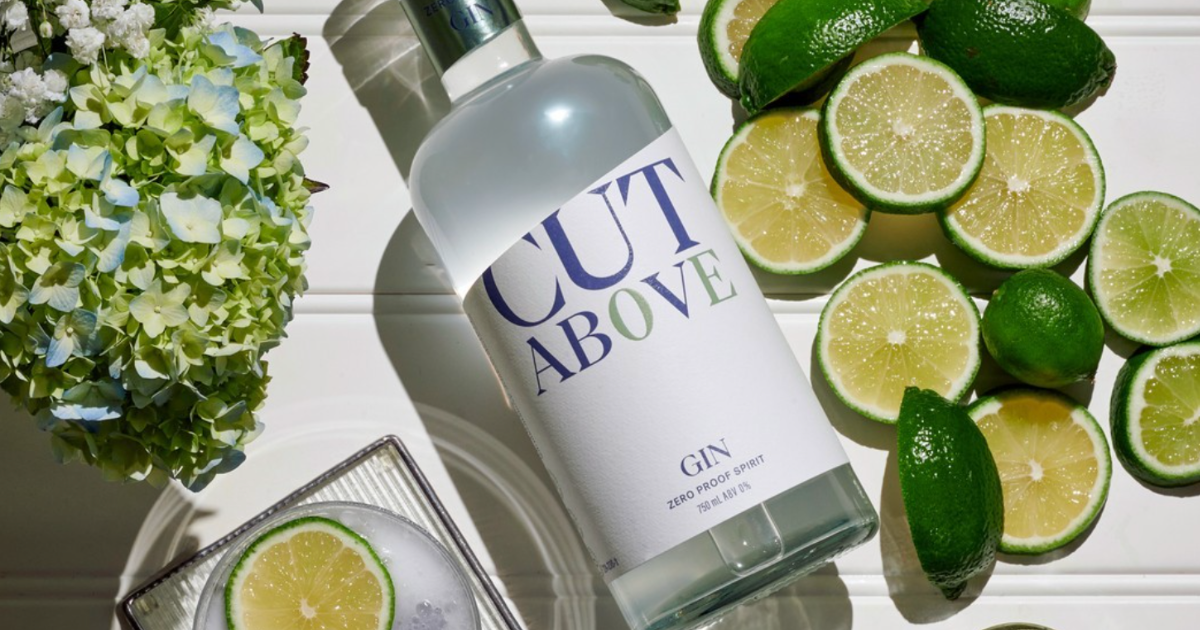Gin, celebrated for its aromatic blend of juniper berries and botanicals, has long held a revered place in the world of spirits. But, as the non-alcoholic movement continues to grow, a new wave of non-alc gins has emerged, promising the familiar flavors without the alcohol. Our comprehensive guide delves into this burgeoning category, offering insights into how non-alc gins are made, top brands to explore, and how to enjoy them yourself.
About gin
The story of gin begins in the busy apothecaries of medieval Europe. Initially conceived as a medicinal liquor, gin has its roots in the juniper-infused spirits produced by monks and alchemists across the continent. Known then as “jenever,” its primary objective was to harness the therapeutic properties of juniper berries, which were believed to offer remedies for a range of ailments.
The spirit’s journey took a pivotal turn in the 17th century during the Eighty Years’ War, when British soldiers fighting in Holland encountered jenever. They observed Dutch troops sipping this robust spirit before battle, a practice believed to bolster their bravery (leading to the term “Dutch Courage”). As these soldiers returned to England, they brought back with them a fondness for this juniper-infused spirit. Soon, the gin craze began.
By the 18th century, gin production was in full swing in England. The spirit’s popularity was further amplified due to a series of legislative acts that made it easier and more profitable to produce gin rather than beer or wine. London became the epicenter of a gin epidemic, with the spirit affectionately dubbed “Mother’s Ruin” due to its widespread consumption and, occasionally, the social issues it created.
However, gin’s reputation would be rehabilitated in the 19th century, particularly with the establishment of high-quality gin distilleries that prioritized purity and flavor. The introduction of the column still allowed for a much cleaner, refined distillation process. As British colonialism spread, so did gin, which found its perfect partner in tonic water, a beverage consumed by British officers in tropical colonies to combat malaria, leading to the classic gin and tonic we know today.
What is non-alcoholic gin?
In recent years, there’s been a surge in the demand for non-alcoholic versions of classic spirits, and gin is no exception. But what exactly is non-alc gin?
Non-alc gins aim to capture the aromatic essence and complexity of traditional gins, without the alcohol. These alternatives often emphasize juniper, citrus, and other herbs to mimic the flavor profile of their alcoholic counterparts, ideal for those seeking the taste without the booze.
How, exactly, is gin’s essence captured without alcohol? Let’s dive into the process.
- Selection of botanicals: the heart of any gin, alcoholic or not, lies in its choice of botanicals. Juniper berries are the primary ingredient, lending that quintessential gin flavor. Beyond juniper, a myriad of other botanicals like coriander seeds, angelica root, citrus peels, and more exotic ingredients can be included to create a unique flavor profile.
- Extraction: the selected botanicals undergo a process of extraction to release their flavors. This often involves steeping them in water, much like making a concentrated tea. Without the presence of alcohol, which naturally extracts flavors, this step is crucial for obtaining a robust botanical character.
- Distillation: some non-alcoholic gins employ a process of distillation using specialized equipment that operates at lower temperatures. Known as vacuum distillation, this method allows the capturing of delicate aromas and flavors without the need for alcohol.
- Blending: once the individual botanical extracts are prepared, they’re meticulously blended. This step requires the skill of a master blender, ensuring the final product has balance, depth, and the desired flavor profile.
- Filtration: the blended mixture undergoes filtration to remove any particulates, resulting in a clear and clean spirit.
- Bottling: finally, the non-alcoholic gin is bottled, sealed, and prepared for distribution. Some brands might add natural preservatives at this stage to enhance the product’s shelf life, given the absence of preserving alcohol.
How to choose a non-alcoholic gin
As the world of non-alcoholic spirits expands, the options on the shelves multiply. For those seeking the essence of gin without the alcohol, here’s a simple guide to picking the best non-alcoholic gin for your palate.
- Botanical profile: just like its alcoholic counterpart, the essence of a non-alc gin lies in its botanicals. Review the list of ingredients, looking out for juniper as a primary component, which is the hallmark of a gin’s flavor. Additionally, consider the other botanicals used. Do you prefer a citrus-forward profile or something more herbal?
- Brand reputation: as the non-alc spirits category is still nascent, it’s beneficial to consider reviews and feedback on various brands. Established names in the alcoholic spirits world who’ve ventured into non-alc offerings might provide a certain assurance of quality, but don’t shy away from smaller brands that might be pushing the envelope in terms of innovation.
- Taste test: if possible, attend tastings or purchase sample-sized bottles. As with alcoholic gins, personal preference plays a significant role. What resonates with one individual might not be a hit with another, so sampling a few varieties can help you pinpoint your favorite.
- Versatility: consider how you plan to use the non-alcoholic gin. If it’s primarily for cocktails, you might seek a bolder flavor that can shine through mixers. However, if you’re aiming for a simple gin and tonic, a more balanced and nuanced option might be preferable.
- Clarity on additives: investigate if the brand uses any additives or artificial flavorings. For those seeking a natural product, it’s crucial to ensure that the non-alcoholic gin you’re selecting is free from unwanted chemicals or synthetic flavors.
Remember, the non-alcoholic spirits category is continuously evolving, with brands constantly innovating to improve their offerings. It’s an exciting time to explore, taste, and discover the nuances of non-alc gin.
Comparing the best non-alcoholic gins
Here are five of my favorite non-alcoholic gins as of August 2024.
In my opinion, this brand truly lives up to its name by offering a premium non-alc gin experience. Known for its sophisticated botanical blend, Cut Above captures the essence of classic gin with dominant juniper notes complemented by hints of coriander and citrus. It’s a choice for those seeking a richer, more authentic gin-like flavor in their mocktails.
Bringing a fresh approach to the non-alcoholic spirits category, Monday’s gin alternative is light, crisp, and refreshingly aromatic. It presents a slightly more modern take on the traditional gin profile, with a more pronounced citrus character. It’s ideal for those who enjoy a zesty kick to their gin-based drinks. A longtime personal favorite of mine.
Living up to its liberating name, Free Spirits’s take on gin emphasizes botanical freedom. It boasts a well-rounded profile with not just juniper, but also undertones of herbs and spices. The brand has managed to craft a balanced flavor that’s both versatile for mixology and delightful when combined with tonic.
Ritual Zero Proof takes a holistic approach, mirroring the complexities of alcoholic gins. Its botanical range is vast, ensuring that every sip unfolds layers of flavor. From spicy notes to floral undertones, it’s a choice for those who love diving deep into the intricacies of gin flavors.
Pioneers in the non-alcoholic spirits industry, CleanCo’s gin alternative is clean, smooth, and highly refined. Their version emphasizes a smooth finish, making it suitable for those new to the world of gin. The botanical profile is subtle yet intricate, suitable for a wide range of cocktails.
Just released in the summer of 2024, we can’t wait to try this zero proof gin. A collaboration between Yorkshire distillery York Gin and non-alc distilled botanical spirit pioneer Bax Botanics, York Zero purports to feature the classic gin flavors of juniper and coriander, plus some unique foraged botanicals courtesy of Rose and Chris Bax.
Non-alcoholic gin cocktail ideas
For a simple serve that allows the flavors of the spirit to shine, it’s hard to beat a classic:
G&T Mocktail
Ingredients:
- 2 oz non-alc gin
- 4 oz tonic water
- Lime wedge
- Ice
- Sprig of rosemary or cucumber slice (optional)
For more advanced alcohol-free mixology, try your hand at one of the following mocktails:
Non-Alcoholic Tom Collins
Ingredients:
- 2 oz non-alc gin
- 1 oz fresh lemon juice
- 0.5 oz simple syrup
- Club soda
- Lemon wedge or slice for garnish
- Cherry for garnish (optional)
In a shaker, combine the gin, lemon juice, and simple syrup. Shake well. Strain into a tall glass filled with ice. Top with club soda. Garnish with a lemon wedge or slice and, optionally, a cherry.
Booze-Free Negroni
Ingredients:
- 1 oz non-alc gin
- 1 oz non-alc vermouth
- 1 oz non-alc bitter aperitif (such as Haus of Babylon, Ritual Aperitif, Fluere Bitter, or Antidote Bitter Red)
- Orange slice or twist for garnish
Combine the non-alcoholic gin, vermouth, and bitter aperitif in a mixing glass with ice. Stir well until chilled. Strain into a rocks glass over fresh ice. Garnish with an orange slice or twist.
Gin Martini
The non-alc martini is a more challenging endeavor, necessitating an article all its own: What Are We Going to Do About Martinis?
FAQs about non-alcoholic gins
Why would anyone drink non-alcoholic gin?
People choose non-alcoholic gin for various reasons, including lifestyle preferences, health considerations, and the desire to enjoy the social aspects of drinking a cocktail without alcohol’s effects.
What does non-alcoholic gin taste like?
At its core, the essence of gin lies in its botanicals, with juniper often taking center stage. When crafted meticulously, non-alcoholic gins can mirror the aromatic complexity of traditional gins, offering layers of juniper, citrus, and herbal notes.
Non-alc gins aim to capture the essence and flavor profile of traditional gin without the alcohol content. However, the taste can vary based on the brand and the production method. Generally, non-alcoholic gin will strive to replicate the following characteristics of gin:
- Juniper-forward: just like its alcoholic counterpart, non-alc gin usually has a pronounced juniper berry flavor, giving it a piney, resinous note.
- Citrus elements: many non-alc gins incorporate citrus peels, such as lemon or orange, which bring bright, zesty undertones to the palate.
- Herbaceous and green: ingredients like coriander, angelica root, and orris root can offer earthy, green, and slightly spicy notes.
- Floral hints: some non-alcoholic gins might have subtle floral tones, often from ingredients like lavender or rose petals.
- Warm spices: botanicals like cardamom, cassia bark, or grains of paradise can introduce warm, spicy, and sometimes slightly peppery nuances.
- Slightly sweet or malty: depending on the brand, there might be a slight sweetness or malty note, not from sugars but from the botanicals or the base used to create the spirit.
- Aromatic and bitter: to replicate the depth of alcoholic gin, some non-alcoholic gins use aromatic herbs and roots that might add a touch of bitterness, akin to the bite of alcohol.
Does non-alcoholic gin actually taste like alcoholic gin?
There will always be some differences due to the absence of alcohol. Your experience will also depend on the quality of the product and its formulation. Some brands might be closer in flavor to traditional gin, while others might offer a more unique or different interpretation of the spirit.
What’s often missed in non-alcoholic versions is the warmth and bite of the alcohol, which can play a significant role in the overall mouthfeel and finish. While high-quality non-alc gins can come close to replicating the nuanced flavor profiles, there’s an inherent difference in the depth and richness, making the experience of each unique in its own right. For purists, the distinction may be more pronounced, but for many, non-alc gins offer a satisfying alternative that echoes the spirit of the original.
Is non-alcoholic gin good for you?
Non-alcoholic gin is emerging as a healthier alternative to its traditional alcoholic counterpart, owing largely to the absence of ethanol.
Ethanol, the primary intoxicating ingredient in alcoholic beverages, has been linked to a host of health issues, ranging from liver damage and addiction to metabolic disruptions and cognitive impairments when consumed excessively. Furthermore, the absence of alcohol means non-alc gin usually contains fewer calories, potentially benefiting those mindful of their caloric intake.
Beyond the lack of ethanol, many non-alc gin brands emphasize natural ingredients, eschewing artificial flavors and sweeteners, which can be detrimental to health in their own right. This focus on natural components often results in a beverage that aligns more closely with health-conscious consumer preferences. However, as with any beverage choice, individual health considerations are crucial when integrating non-alc gin into one’s lifestyle.
What’s the best non-alcoholic gin for cocktails?
When deciding on the best non-alcoholic gin for cocktails, you might consider:
- Sampling: taste is personal. If possible, sample a few options to decide which one resonates with your palate.
- Reading reviews: online reviews can offer insights on how a particular brand performs in cocktails. My five favorites are listed above but it’s a personal choice.
- Versatility: consider how the non-alc gin pairs with various mixers and if it can be used in a wide range of mocktails.
Lastly, as the non-alc spirits industry is rapidly evolving, new brands and improved formulations frequently emerge. Staying updated with industry news and trends can help you discover new and exciting options for your cocktails.
What’s the best non-alcoholic gin for a gin and tonic?
When choosing a non-alcoholic gin for a gin and tonic, consider the following:
- Taste profile: depending on your palate, you may want to opt for a brand that retains the smooth, juniper-forward profile of traditional gin.
- Mouthfeel: one of the challenges of non-alcoholic spirits is replicating the warmth and body of alcohol. See reviews or taste test to find one that isn’t too thin or watery.
- Mixability: ensure that the non-alcoholic gin mixes well with other ingredients, especially if you’re planning to make cocktails.
It’s always a good idea to check the latest reviews or visit specialized stores where you can sample or get recommendations. As the non-alcoholic category is booming, more and more options are likely to emerge, potentially offering even closer approximations to the real thing.
Are there other alcohol-free spirits?
As of August 2024, there are 1,300+ different alcohol alternatives on the global market, including non-alcoholic spirits like gin and whiskey, non-alcoholic wines like Chardonnay and Cabernet Sauvignon, non-alcoholic beers like stouts and lagers, ready-to-drink mocktails like palomas and mules, as well as bitters, aperitivi, sparkling teas, and much more. There’s something for everyone!






